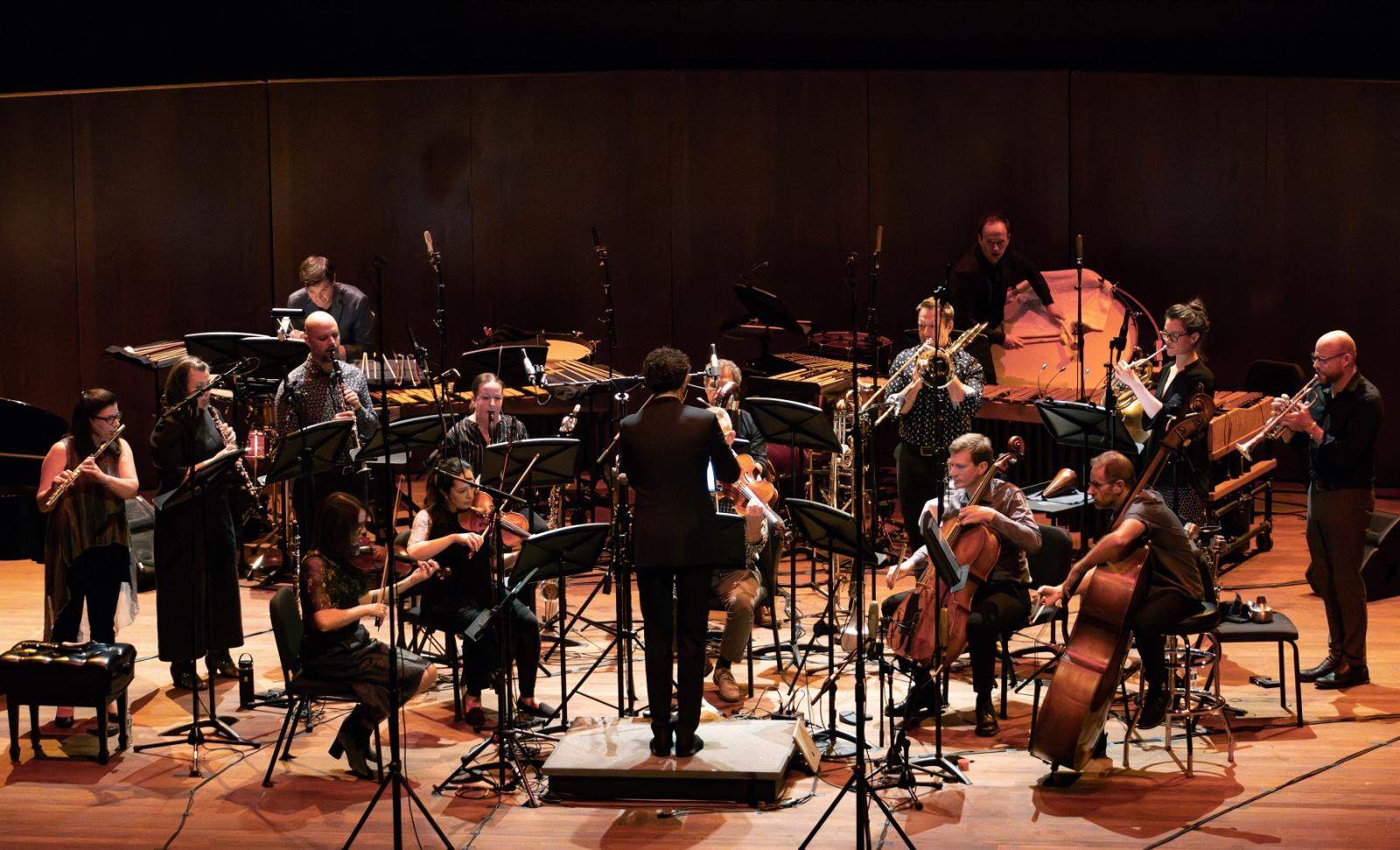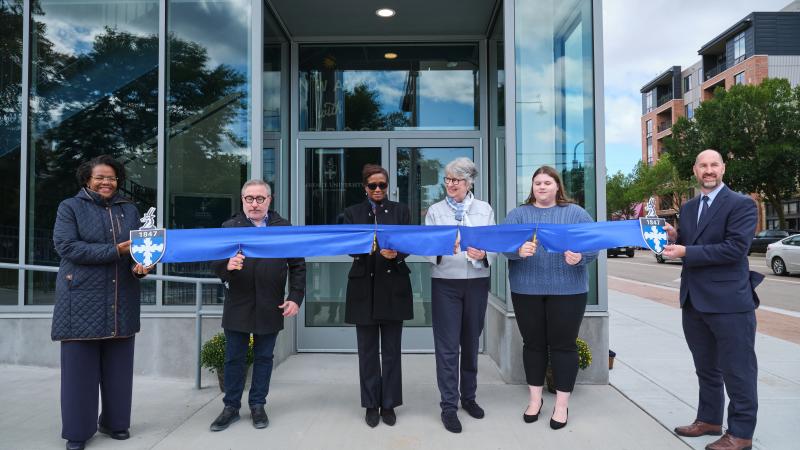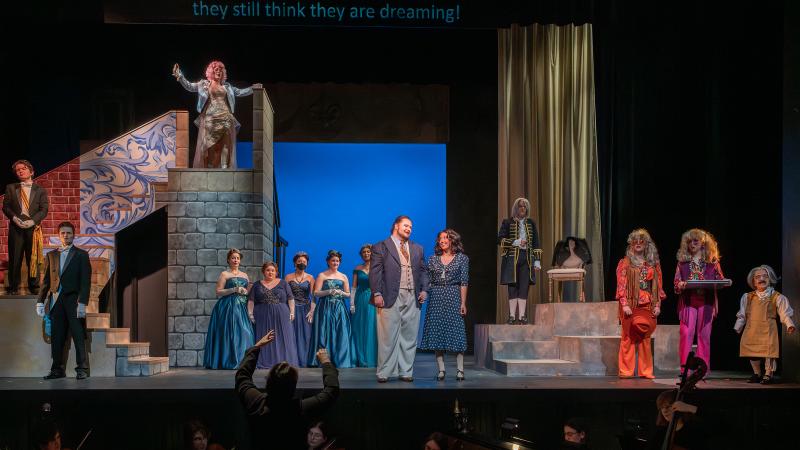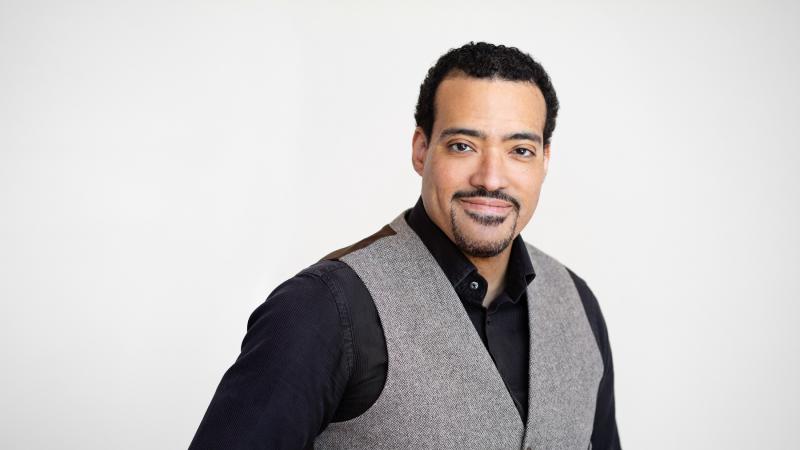Michael Clayville doesn’t have to look far to find inspiration for his teaching.
The instructor of music in entrepreneurial studies and social engagement in Lawrence University’s Conservatory of Music is one of the founding members of Alarm Will Sound, an innovative 20-member ensemble launched nearly 25 years ago and hailed for its groundbreaking embrace of contemporary classical music—pop-influenced, experimental, and mainstream modernism all wrapped into one technically challenging musical adventure.
“Building this ensemble from the ground up was an entrepreneurial journey, though I didn’t realize it at the time,” said Clayville, who joined the Lawrence faculty in 2017.
Alarm Will Sound, which for the last 13 years has included Lawrence flute professor Erin Lesser, continues to flourish. The ensemble is featured on Land of Winter, a new album of music from composer Donnacha Dennehy being released Nov. 15 on Nonesuch Records. Celebratory concerts are set for Dec. 11 and 12 at the Irish Arts Center in New York City. In addition, the ensemble will embark on a four-city tour with the multimedia project Sun Dogs, with stops in St. Charles, Illinois, New York, Minneapolis, and Los Angeles. All that follows the group’s recent premiere in Richmond, Virginia, of a new opera, What Belongs to You, by composer David T. Little.
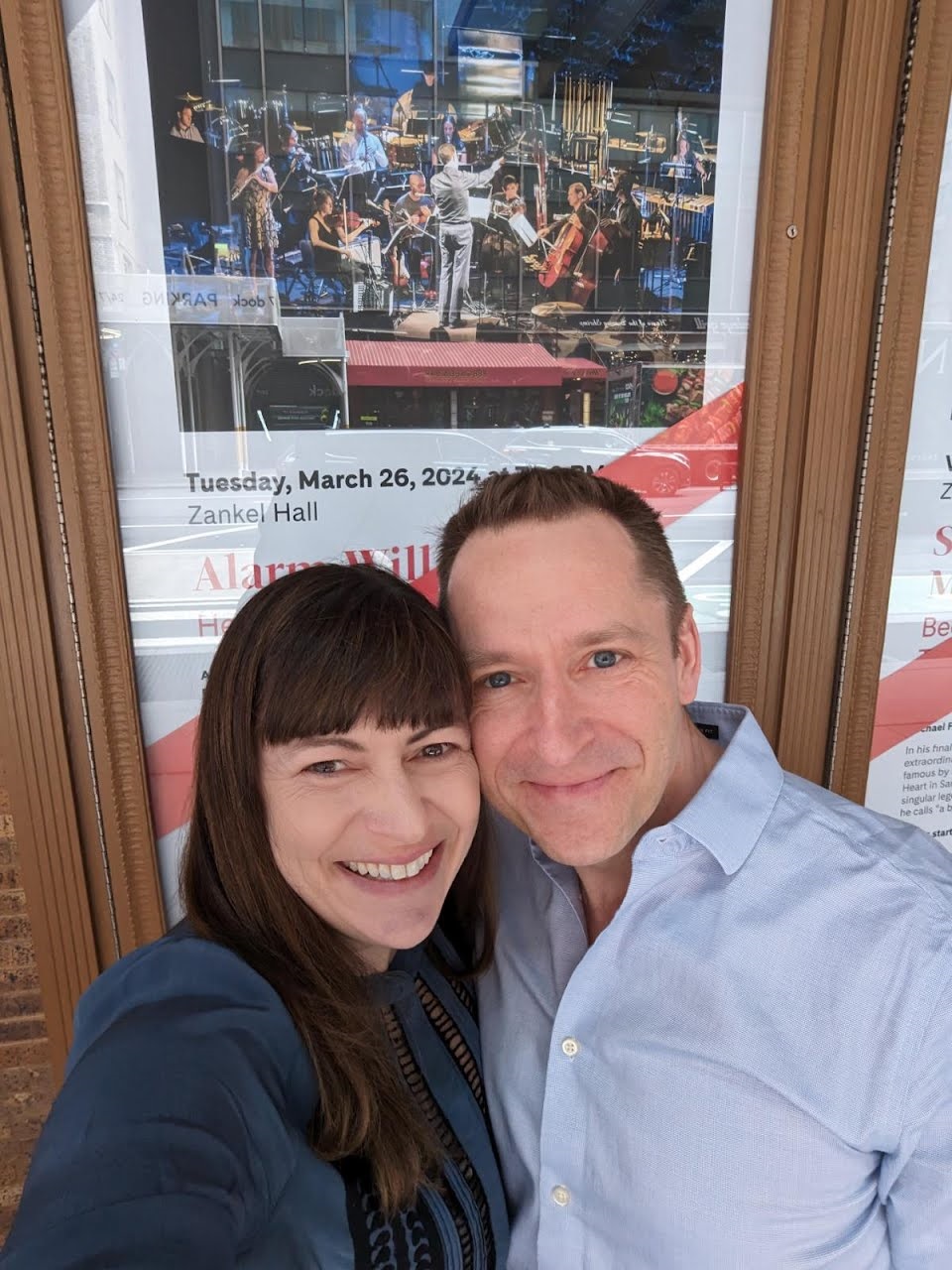
Erin Lesser and Michael Clayville
Clayville was a student at the Eastman School of Music in the mid-1990s—a trombonist drawn to contemporary music—when he came upon a group of like-minded music students who would eventually form Alarm Will Sound. By the early 2000s, the group was performing on major stages and recording a wide range of contemporary composers, drawing praise from The New York Times, Washington Post, National Public Radio, and other media heavyweights for its commitment to innovation. As collaborations and other opportunities grew, Clayville would double as the ensemble’s marketing director, giving him insight into the entrepreneurial swath of the music industry that now fuels much of his teaching at Lawrence.
“It’s not about creating something niche or exclusive—it’s about creating music that rewards curiosity and openness,” Clayville said.
The new album comes with two commissioned videos—one already released and one set to drop with the release of the album.
Lesser, an accomplished soloist and chamber musician who has taught on the Conservatory faculty since 2011, calls Dennehy’s music among her favorites to perform, with its spectral tuning and intricate rhythms creating a style that demands complete engagement. Land of Winter is made up of 12 movements, played continuously, that capture the changing light and mood of Ireland across the cycle of a year.
“For me, it’s a journey, both in playing and in listening,” Lesser said. “We’ve played it a few times now and I always feel shock when I see that I’m at the last page and the piece is coming to an end. Time takes on a different meaning when I become so drawn into an experience.”
For both Clayville and Lesser, who are married, the experiences with Alarm Will Sound inform their teaching at Lawrence. It shows up in their music instruction, in their embrace of contemporary classical music, and in their commitment to teaching the entrepreneurial side of being a musician. Clayville said the fear, doubt, and questioning that came with launching and then sustaining Alarm Will Sound is now shared with his students in courses such as The Entrepreneurial Musician and The Business of You.
“These classes are all about understanding how to take your passion and turn it into something that can thrive in the real world, even when things feel uncertain,” he said.
Integrate intellectual and musical virtuosity in a supportive community that will empower you to find your musical path.
Lesser has leaned on her Alarm Will Sound experiences—maintaining a commitment to contemporary music, pushing boundaries, and nurturing collaborations in jazz, electronic music, and other genres—as she’s guided students in the Conservatory. It shapes how she prepares students for the contemporary musical landscape, teaching them to embrace new works, collaborate with living composers, and engage with pressing cultural issues through music.
“I often get ideas for specific composers to engage with, or pieces to program, directly from my Alarm Will Sound work,” she said.
She points to composer John Luther Adams writing Ten Thousand Birds for Alarm Will Sound. The Lawrence University New Music Ensemble (LuNuMu) has now performed the piece on campus, at Björklunden, and at the Green Bay Botanical Gardens. After inti figgis-vizueta wrote a piece for Alarm Will Sound as one of the resident composers at the Mizzou International Composers Festival, Clayville and Lesser organized a residency at Lawrence for her and programmed works with the LU Flute Ensemble, LuNuMu, and chamber ensembles.
“The connection between my performance work and teaching is constant and inspiring,” Lesser said.
Even the process of joining Alarm Will Sound provided Lesser with important teaching moments. An audition that began in 2010 took upwards of a full year. She played excerpts and solo pieces and performed with the group in New York, Los Angeles, and Germany before being welcomed into the ensemble in 2011.
“As grueling as it was, that audition allowed me to dive deep into the ensemble's mission, learn the full range of what they do, and get to know the amazing people in the group,” she said. “I’ve always loved contemporary music; and Alarm Will Sound was on my radar, but the process solidified how much I wanted to be part of this innovative and boundary-pushing ensemble.”
The evolution of the group over more than two decades can now be seen in how it interacts with living composers. At the ensemble’s outset, “contemporary” most often meant pieces written in the mid-1900s. Now, most of the music being performed by Alarm Will Sound is newly written, often composed specifically for the group.
“It’s important to us that we perform music that reflects the contemporary world,” Clayville said. “Playing music by living composers helps me stay connected to what’s happening in society.”
That builds a deep respect for the process of music creation, which Clayville said he then brings to his work with students at Lawrence.
“I encourage students to approach their performances with a sense of curiosity and openness, knowing that every piece of music is part of a larger ecosystem that involves composers, performers, and audiences,” he said.
